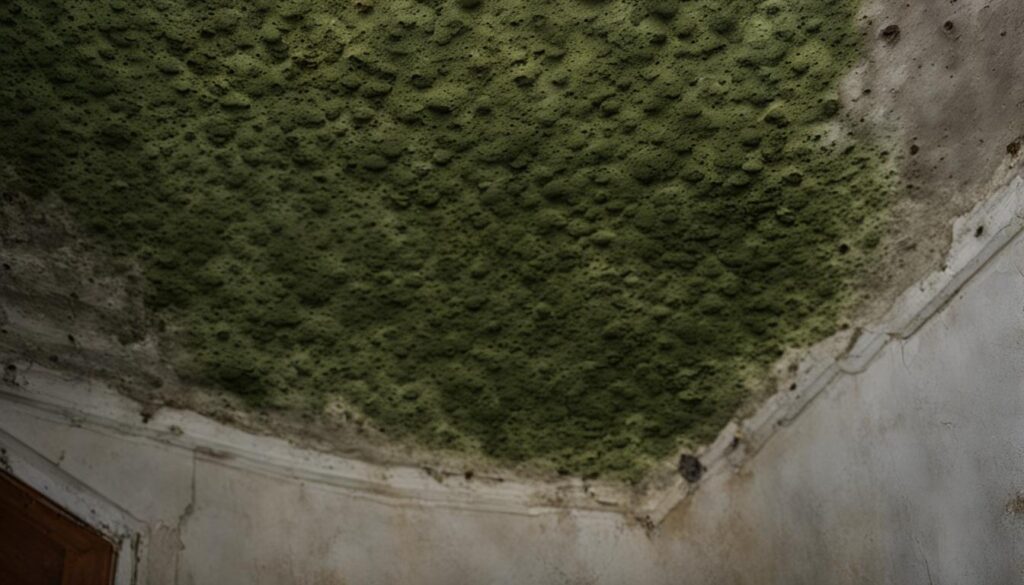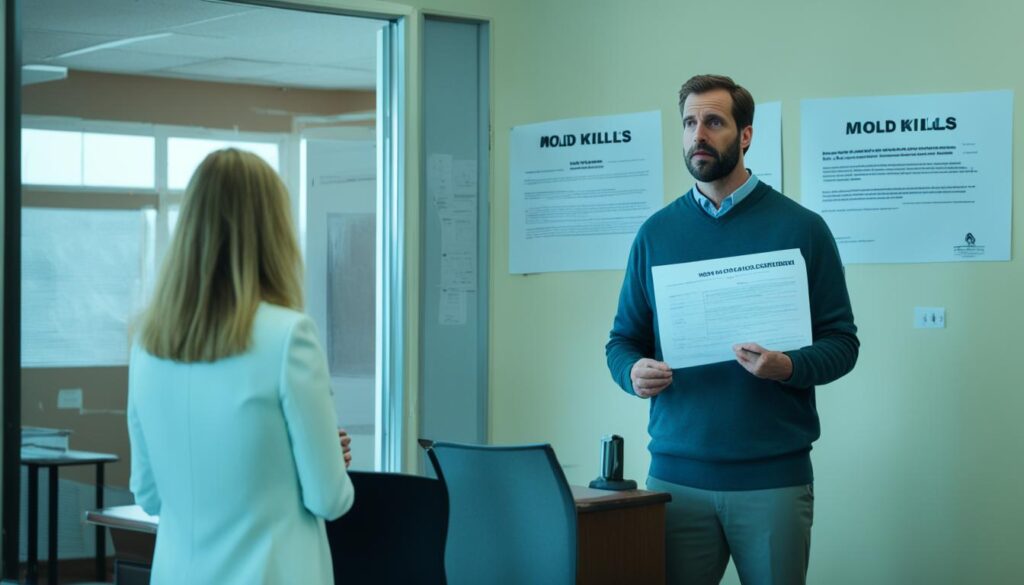
Suing Landlords for Unresolved Black Mold Issues
Dealing with black mold in a rental property can be a serious health concern. Not only can it cause respiratory problems and allergies, but it can also lead to legal issues between tenants and landlords. If you find yourself living in a rental property with a severe black mold problem that your landlord has failed to address, you may be wondering if you have the right to sue.
In this article, we will explore the legal options available to tenants who are dealing with unresolved black mold issues. We will discuss whether you can sue your landlord for neglecting to fix the problem and what rights and responsibilities both parties have in these situations. Understanding your legal options is crucial in protecting your health and finding a resolution to the black mold problem.
Key Takeaways:
- If you are living in a rental property with severe black mold that your landlord has failed to address, you may have legal options.
- An overview of the legal options available to tenants will be discussed, including the possibility of suing your landlord.
- Understanding landlord responsibilities for mold in rental properties is crucial in determining the strength of your case.
- Tenant rights in mold infestation cases will be explored, including the right to a safe and healthy living environment.
- A step-by-step guide on how to sue a landlord for mold infestation will be provided, highlighting the necessary documentation and legal procedures involved.
Landlord Responsibilities for Mold in Rental Property
When it comes to mold in a rental property, landlords have specific responsibilities to ensure the health and safety of their tenants. These responsibilities extend to maintaining a safe and habitable living environment, which includes addressing and remedying any mold issues promptly and effectively.
Mold can pose serious risks to the health of tenants, potentially causing respiratory problems, allergies, and other health issues. As a result, it is crucial for landlords to take mold problems seriously and take immediate action to mitigate and eliminate them.
Under landlord-tenant laws, landlords are typically responsible for the following when it comes to mold in rental properties:
- Mold Prevention: Landlords should take proactive measures to prevent mold from occurring in the first place. This may include regular inspections of the property and prompt repairs for any moisture issues that could contribute to mold growth.
- Mold Remediation: If mold does appear in the rental property, landlords are responsible for addressing the issue promptly and effectively. This may involve hiring professional mold remediation services to safely remove and eliminate the mold.
- Property Maintenance: Landlords are responsible for maintaining the property in a condition that is habitable and free from hazards, including mold. This includes repairing any leaks, addressing water damage, providing proper ventilation, and ensuring the property is adequately insulated.
- Notification and Communication: Landlords should notify tenants promptly if mold is discovered in the rental property. They should also communicate openly and honestly with tenants about the steps being taken to address the mold problem and provide a timeline for remediation.
In the event that a landlord fails to fulfill these responsibilities and neglects to address mold issues, tenants may have rights to take legal action. Tenants can potentially file a lawsuit against their landlord for negligence, seeking compensation for damages, medical expenses, and even relocating costs.
“Landlords are responsible for maintaining a safe and habitable living environment for their tenants, including promptly addressing and remedying any mold issues that may arise.”
Taking legal action against a landlord for mold infestation requires proper documentation and evidence. Tenants should keep detailed records of their communication with the landlord regarding the mold issue, including when they reported it, any repairs or remediation efforts that were promised or carried out, and any medical expenses incurred as a result of the mold exposure.
Additionally, tenants may consider seeking legal advice from a qualified attorney who specializes in landlord-tenant disputes and mold-related issues. An attorney can provide guidance on state-specific laws, tenant rights, and the best course of action to take in pursuing a lawsuit against a negligent landlord.
In the next section, we will delve into the rights that tenants have when facing black mold infestations in their rental properties and explore the potential legal avenues available to them.
Tenant Rights in Mold Infestation Cases
When tenants encounter black mold infestations in their rental properties, they have certain rights that protect their health and well-being. It is essential for tenants to understand these rights and take appropriate actions to address the mold problem.
Tenants have the right to a safe and healthy living environment, which includes protection from mold infestations. When mold is present in a rental property, it can pose significant health risks, particularly for individuals with pre-existing respiratory conditions or compromised immune systems.
If you discover black mold in your rental property, it is crucial to promptly report the issue to your landlord or property management company. Some landlords may be unaware of the mold problem, so notifying them is the first step in addressing the issue. Document your communication with the landlord, including dates and details of your reports.
If the landlord fails to address the mold problem within a reasonable timeframe, tenants have various options to protect their rights and safety. One option is to contact local housing authorities or health departments to report the issue and seek their intervention. These agencies can conduct inspections and issue citations to landlords who neglect their responsibilities.
In more severe cases where the landlord’s negligence persists, tenants may consider legal action. By suing the landlord for unsafe living conditions caused by black mold, tenants can seek compensation for any physical or emotional damages and hold the landlord accountable for their negligence.
Taking Legal Action Against the Landlord
When taking legal action against a landlord for mold infestation, tenants must provide evidence to support their claim. This evidence may include:
- Photographs or videos of the mold growth
- Documentation of the mold-related health effects experienced by tenants
- Records of the tenant’s attempts to report the issue to the landlord
- Expert mold assessments or reports
It is important for tenants to consult with an attorney who specializes in landlord-tenant law and has experience with mold-related cases. An attorney can guide tenants through the legal process, help gather evidence, and advocate for their rights in court.
Remember, tenant rights regarding black mold infestations may vary by state, so it is crucial to understand the specific laws and regulations that apply in your jurisdiction. Consulting with a legal professional will ensure that you are well-informed and can take appropriate actions to protect your rights.

| Tenant Rights | Explanation |
|---|---|
| Right to a safe and healthy living environment | Tenants have the right to live in a rental property that is free from mold infestations and other health hazards. |
| Right to report mold issues to the landlord | Tenants should promptly notify their landlord of any mold problems in writing and keep a record of the communication. |
| Right to seek intervention from local housing authorities | If the landlord fails to address the mold issue, tenants can report the problem to local housing authorities or health departments for inspection and enforcement. |
| Right to take legal action | In cases of severe negligence, tenants can sue the landlord for unsafe living conditions caused by mold infestation. |
The Process of Suing a Landlord for Mold Infestation
If you are dealing with a mold infestation in your rental property and your landlord has failed to address the issue, you have the right to take legal action. Suing your landlord for mold infestation can be a complex process, but with the right documentation, evidence, and understanding of the legal procedures, you can seek justice for the harm caused by landlord negligence.
Here is a step-by-step guide on how to sue your landlord for mold infestation:
- Gather evidence: Document the mold problem in your rental property. Take clear photographs or videos of the affected areas, making sure to capture the extent of the mold growth. Keep any written communication with your landlord regarding the mold issue as evidence.
- Notify your landlord: In accordance with your lease agreement and local laws, provide written notice to your landlord about the mold problem. Be sure to keep a copy of the notice for your records.
- Request mold testing: If your landlord refuses to address the mold issue or denies its severity, consider hiring a professional mold inspector to assess the property and provide a written report outlining the extent of the mold problem.
- Consult with an attorney: It is advisable to seek legal counsel from a qualified attorney specializing in tenant rights and mold infestation cases. They can help you understand your legal rights, guide you through the legal process, and represent you in court if necessary.
- Filing a lawsuit: Your attorney will prepare and file a lawsuit against your landlord for mold infestation. They will ensure that all necessary documentation, evidence, and legal forms are submitted correctly and within the specified timeframes.
- Attending court hearings: Be prepared to attend court hearings related to your mold infestation case. Your attorney will represent you and present your case to the judge, highlighting the landlord’s negligence and the resulting harm caused to your health and well-being.
- Potential outcomes: The outcome of your lawsuit will depend on various factors, including the strength of your evidence, local laws, and the judge’s decision. If successful, you may be entitled to compensation for medical expenses, property damage, relocation costs, and even emotional distress caused by the mold infestation.
Taking legal action against your landlord for mold infestation is a complex process that requires careful planning, documentation, and legal expertise. It is essential to consult with an experienced attorney who can guide you through the necessary steps and help you navigate the legal system to protect your tenant rights and seek justice.
| Benefits of Suing a Landlord for Mold Infestation | Considerations When Suing a Landlord for Mold Infestation |
|---|---|
| 1. Hold the landlord accountable for negligence. | 1. The cost and time involved in pursuing a lawsuit. |
| 2. Seek compensation for damages and losses. | 2. The need for strong evidence and documentation. |
| 3. Protect your health and well-being. | 3. Potential landlord retaliation or disputes. |
Seeking Legal Remedies for Mold Issues
When faced with mold issues in their rental properties, tenants have legal options to seek remedies and hold their landlords accountable. While lawsuits may be an option, there are alternative avenues that tenants can explore to address these issues effectively.
Filing Complaints with Local Housing Authorities
One alternative is to file a complaint with local housing authorities. Such authorities have jurisdiction over the enforcement of housing standards and can investigate reports of mold in rental properties. By lodging a formal complaint, tenants can bring attention to the unsafe living conditions caused by mold and prompt the authorities to take appropriate action.
Seeking Injunctions for Immediate Remediation
Another legal option is to seek an injunction. Tenants can request a court order that compels their landlord to address the mold problem promptly. Injunctions are particularly useful when immediate remediation is necessary to prevent further health risks or property damage.
Mediation or Arbitration as Alternatives to Litigation
Besides lawsuits, tenants can also consider mediation or arbitration as alternative dispute resolution methods. Mediation involves a neutral third party helping both the tenant and the landlord reach a mutually acceptable settlement. Arbitration, on the other hand, involves an impartial individual or panel that reviews evidence and makes a binding decision to resolve the dispute. Both methods offer a less formal and potentially more cost-effective approach than going to court.
Importance of Documentation and Professional Assessments
Regardless of the legal remedy pursued, it is essential for tenants to document the mold problem extensively. This can include taking photographs, collecting correspondence, and recording any adverse effects on their health or property. Obtaining professional assessments from certified mold inspectors can also provide valuable evidence of the extent and severity of the mold infestation.
By seeking legal remedies, tenants can assert their rights and compel landlords to address mold issues in rental properties. Whether through filing complaints, seeking injunctions, or pursuing alternative dispute resolution methods, tenants have options to ensure safe and habitable living conditions.

Remember, dealing with mold issues in your rental property can be challenging, but there are legal avenues available to protect your rights as a tenant. Consult with an attorney specializing in landlord-tenant law to explore the best course of action for your specific situation.
Hiring Professionals for Mold Assessment and Remediation
Hiring professionals for mold assessment, prevention, and remediation is crucial when dealing with mold issues in rental properties. Fix Mold Miami is a trusted company in Florida that provides comprehensive services to address and eliminate mold problems. Their team of experts specializes in mold assessment, prevention, and remediation, ensuring the safety and well-being of tenants.
Mold assessment involves a thorough inspection of the property to identify the presence of mold and assess its extent. Professionals use advanced techniques and equipment to accurately detect mold spores, even in hard-to-reach areas. This assessment serves as crucial evidence in legal cases, providing a clear picture of the mold problem and its impact on the property.
Prevention is key to minimizing mold growth and protecting the health of tenants. Fix Mold Miami offers effective preventive measures that help reduce the risk of mold infestations. Their experts provide guidance on proper ventilation, moisture control, and other proactive strategies to create a mold-resistant environment in rental properties.
In the unfortunate event of an existing mold infestation, mold remediation is essential to eliminate the problem and restore a safe living environment. Fix Mold Miami utilizes industry-standard techniques to remove mold safely and efficiently. Their certified professionals employ advanced equipment and follow rigorous protocols to ensure thorough mold removal while preventing cross-contamination.
By hiring professionals for mold assessment and remediation, tenants can have peace of mind knowing that qualified experts are handling the complex task of mold detection, prevention, and removal. This not only protects their health and well-being but also strengthens their legal stance in cases against negligent landlords.
Contact Fix Mold Miami today to schedule a mold assessment and receive expert guidance on mold prevention and remediation in your rental property.
Fix Mold Miami is a trusted company specializing in mold assessment, prevention, and remediation. Contact them today for professional assistance in dealing with mold issues in your rental property.
Conclusion
In conclusion, tenants facing severe black mold problems in their rental properties have legal options to hold their landlords accountable. By understanding landlord responsibilities and asserting their tenant rights, individuals can take proactive steps to address these issues. In some cases, pursuing lawsuits or seeking alternative legal remedies may be necessary to ensure landlords take appropriate action.
Professional mold assessment and remediation services play a crucial role in documenting the severity of the problem and supporting legal claims. Tenants should prioritize their health and safety by promptly addressing mold issues and seeking appropriate legal advice. This proactive approach not only protects tenants’ rights but also contributes to maintaining a safe and habitable living environment.
In situations where landlords neglect their responsibilities, tenants have the right to seek justice and hold landlords accountable for the consequences of mold infestations. By being well-informed, proactive, and seeking professional assistance, tenants can strengthen their position and ensure that their voices are heard in the pursuit of a healthy and mold-free home.




